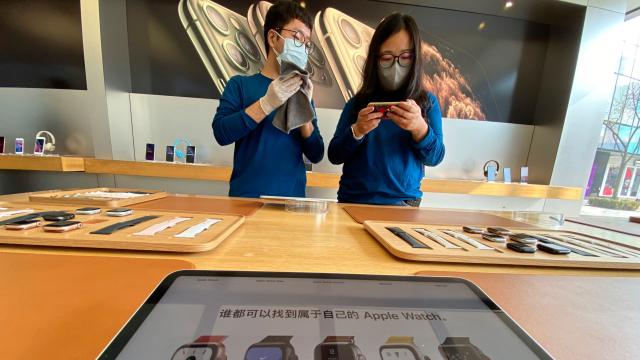As the global outbreak of the novel SARS-CoV-2 coronavirus continues to spread around the globe, Apple has warned technical support staff at stores that it may fall short on replacement iPhones and parts, Bloomberg reported on Wednesday.
Apple employees told Bloomberg that Apple issued warnings to Geniuses (the company’s branding for Apple Store workers who fix software and hardware problems on its devices) that replacement units for phones too damaged to receive repairs may be delayed for the next two to four weeks. Apple has instead encouraged workers to have customers that can’t immediately receive replacements sign up for mail delivery, as well as offer loaner devices to fill short-term gaps. Parts for in-store repairs also appeared to be running low, Bloomberg’s sources said.
Apple’s supply chain is heavily reliant on plants in China, where the virus originated and hit hardest. The March 4 status update from the World Health Organisation identifying over 80,000 cases and just short of 3,000 deaths in China.
Over half a billion people have faced some sort of restrictions on their movement in the country, ranging from total lockdowns to checkpoints where they must submit to temperature checks to pass.
While the Chinese government has tried to keep its tech industry operating throughout the outbreak, factories are experiencing manpower and supply shortages that have cut dramatically into production. One observable effect has been a rapid drop-off in air pollution, with researchers finding smog levels have dipped by 10 to 30 per cent compared with earlier years.
While over 80 per cent of COVID-19 cases are estimated to result in only minor symptoms, the virus’s rapid spread to other countries including South Korea, Iran, Italy, and now the U.S. (with over 93,000 confirmed cases globally) has medical experts concerned that many countries are only readying themselves too late. Whether or not the U.S. will see serious economic disruption remains unclear.
Other tech companies like Facebook, Twitter, and Google that have less of a focus on hardware and retail sales may be better positioned to ride out the storm, as many of their employees can work from home.
Apple is also reportedly running low on iPad Pro models in the U.S., Australia, and Europe as well as AirPods and Apple Watches, Bloomberg separately reported. Facebook has also reportedly been affected by shortages of Oculus Quest headsets and HP is running low on some desktop computer models.
Dozens of industry conferences have been cancelled, including Google I/O and Facebook F8. (SXSW will continue mostly as planned despite some high-profile dropouts like Twitter and TikTok, for now.) Most major tech companies, meanwhile, have imposed some kind of restriction on travel to regions seeing outbreaks.
MIT professor of engineering systems David Simchi-Levi and Causality Link CEO Pierre Haren recently wrote in the MIT Media Review that the global supply chain could be disrupted by “a spike in the temporary closures of assembly and manufacturing facilities in mid-March,” possibly lasting for months.
According to Bloomberg, there is one bright spot for Apple: 38 of its 42 stores in China are open again after closing due to the outbreak. With the Chinese economy experiencing a major contraction, however, it’s not clear how well they will fare sales-wise for the time being.
